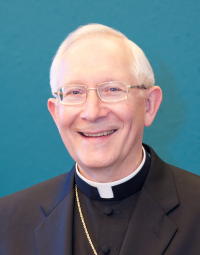
Archbishop Leonard P. Blair
To be, or not to be, that is the question.” So wrote Shakespeare so long ago. What does it mean for anything to “be” What does it mean for me to “be”? Why do I exist and what is my ultimate destiny? Jesus Christ not only answers these questions; he is the answer, and in that faith we, as members of his body, the Church, make our pilgrimage through history, awaiting the fullness of time. It is a difficult pilgrimage, a way of the cross, but at every step God raises up heroes, role models, to give us courage and to show us the way to victory. We call those heroes saints.
Saints are often thought of as belonging to Father McGivney is rightly famous as the founder of the distant times and places, and it is certainly true that over two millennia there have been many, each of whom has a story to tell, an example to give. Those whose witness was so forceful that it led to a devout public following even after their deaths often wind up being publicly recognized and venerated by the whole Church after a thorough ex- amination of their lives and after signs from heaven confirming their presence there.
Knights of Columbus, but his biography is aptly entitled Parish Priest because that was the chief focus of his life. As for the Knights, his purpose was to found a fraternal benefits society for the sake of Catholic parishioners — families whose bread- winners often died very young and very poor with no insurance or public welfare benefits. Over time, the Knights have become a powerful force for charity and for religious and civic virtue.
Much more can and will be said of Father McGivney in days to come. For now, I would simply conclude with these words from the final chapter entitled “A Priest’s Life” of the biography I mentioned earlier: “Two aspects of McGivney’s inner life never wavered … from his earliest days to his last. The first was his faith in Catholicism. For better or for worse, he did not question, he did not surmise. He believed — with impervious conviction. McGivney’s second lifelong char- acteristic was an abiding empathy, with a spirit of kindness extraordinary in his time or any other. It was just that which made him an apostle of Christ.”
As I write this, we, as a society, are experiencing not only the ravages of a pandemic but also hatred for the symbols of religion, Catholicism in particular, whether by vandalism di- rected against religious statues or churches or attacks against the Church in general. Through the intercession of Father McGivney, may we be strengthened in the “impervious convic- tion” of our Catholic faith and be granted a share of his abiding empathy towards all.
We in Connecticut, in the Archdiocese of Hartford, are now very blessed to learn that one of our own, a parish priest of our own, is going to be numbered among the Church’s publicly acknowledged and venerated heroes and heavenly intercessors. I’m referring of course to Father Michael J. McGivney, soon to be Blessed Michael J. McGivney.
Why “Blessed” and not “Saint” Michael J. McGivney? Beat- ification is an intermediate step toward a full declaration of sainthood. Beatification means that a person can be publicly venerated in those localities and among those faithful with a religious devotion to the person in question. Further mir- acles can lead to an act of canonization, whereby veneration is no longer just warranted but required, and is extended to the whole Church. Even though Father McGivney is not yet canonized, he is sure to be venerated far beyond Connecticut since he was the founder of the Knights of Columbus with an international membership.
Father McGivney was born in Waterbury in 1852 and died in Thomaston in 1890 after an illness resulting from something we are now experiencing — namely, a pandemic. He lived at the time of a great priest shortage in Connecticut as thousands of Catholic immigrants poured into the state from Europe, often facing harsh anti-Catholic hostility. Like many priests back then whose lives were hard and who were exposed to the diseases of the poor, Father McGivney died young.
